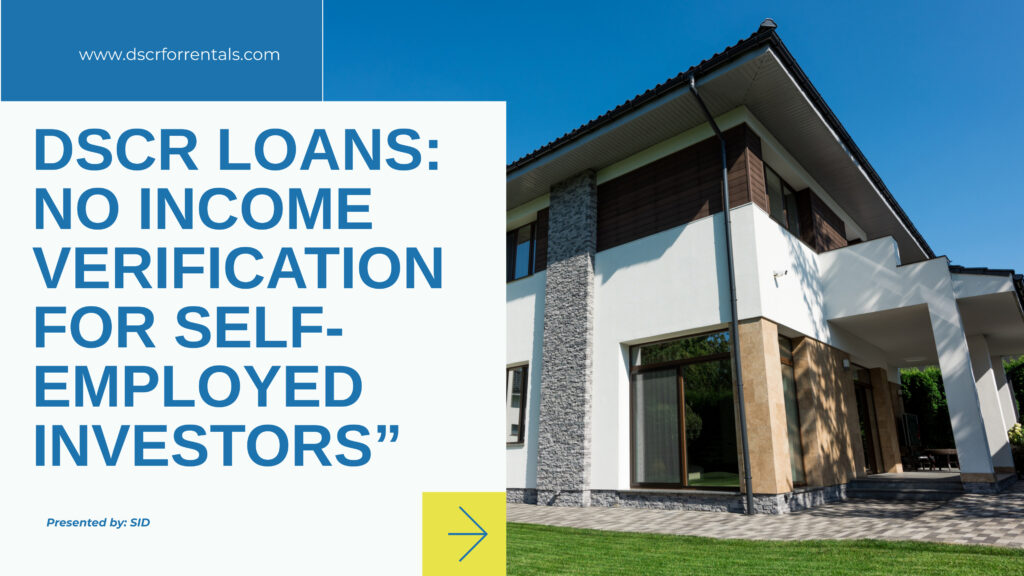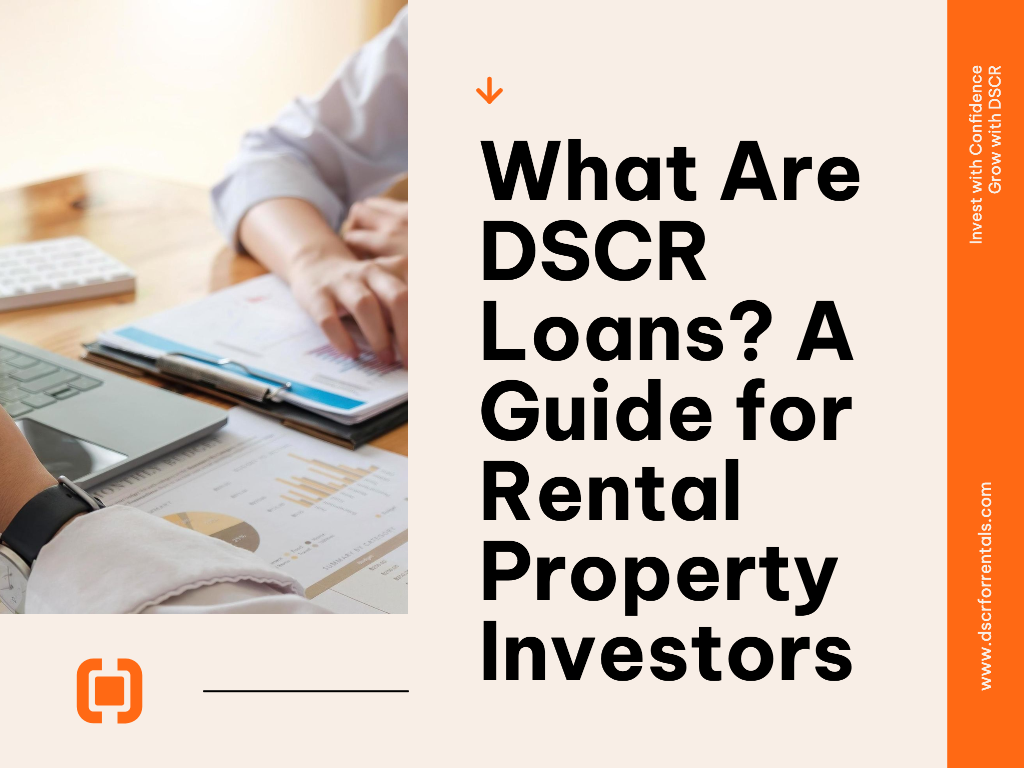DSCR Loans: No Income Verification for Self-Employed Investors

Introduction
As a self-employed real estate investor, you’ve probably heard the same frustrating story from traditional lenders: “We need to see two years of tax returns and consistent income.” But what if your tax strategy specifically minimizes your reported income? What if your business is thriving but doesn’t fit neatly into a W-2 box? You’re not alone! According to recent data, nearly 16 million Americans are self-employed, and many struggle with traditional mortgage qualification.
That’s where DSCR loans come in as a game-changer for investors like you. These loans focus on what really matters – the property’s ability to generate income – rather than your personal finances. Let’s dive into how these powerful lending solutions can transform your investment strategy in 2025!
What Are DSCR Loans and Why Do They Matter for Self-Employed Investors?
DSCR stands for Debt Service Coverage Ratio, a calculation that compares a property’s income to its debt obligations. Unlike conventional loans that scrutinize your personal income, DSCR loans evaluate the property’s income potential instead.
For self-employed investors, this distinction is crucial:
- No tax returns required! Your investment property qualifies based on its own merits
- No need to show personal income verification or employment history
- Perfect for business owners who maximize tax deductions that lower their reported income
- Ideal for investors with complex income structures that traditional lenders don’t understand
As our detailed guide explains, DSCR loans focus on a simple question: “Does this property generate enough income to cover its expenses and debt payments?” If the answer is yes, you’re well on your way to approval!
Understanding the DSCR Calculation
The DSCR calculation is the foundation of these loans, so it’s important to understand how it works. The formula is:
DSCR = Property’s Annual Net Operating Income ÷ Annual Debt Service
Let’s break this down:
- Net Operating Income (NOI) is the property’s gross income minus operating expenses (but not the mortgage payment)
- Annual Debt Service is the total annual mortgage payment including principal, interest, taxes, insurance, and HOA fees if applicable
A DSCR of 1.0 means the property generates exactly enough income to cover its debt obligations. Most lenders look for a minimum DSCR of 1.25, meaning the property generates 25% more income than needed to cover the debt.
Our DSCR calculator tool can help you quickly determine if your property will qualify.
Benefits of DSCR Loans for Self-Employed Real Estate Investors
1. Freedom from Income Verification Requirements
The most obvious benefit is in the name – no income verification! This means:
- No need to provide tax returns that might show minimized income due to write-offs
- No requirement to explain complex business structures to confused loan officers
- No debt-to-income (DTI) calculations that might disqualify successful but “paper-poor” entrepreneurs
- No employment history verification or stability concerns
2. Faster Approval Process
Without the need to verify and analyze personal income:
- Loan processing times can be significantly shorter
- Less documentation required means less back-and-forth with underwriters
- Fewer conditions to satisfy before closing
- Ability to move quickly on time-sensitive investment opportunities
3. Scalability for Your Portfolio
One of the biggest limitations of conventional financing is how quickly you can hit loan limits. Our portfolio building guide explains how DSCR loans offer:
- The ability to grow your portfolio beyond the conventional loan limit of 10 properties
- No impact on your personal debt-to-income ratio for future borrowing
- Potential to close multiple deals simultaneously without waiting periods
- Options for blanket loans covering multiple properties
4. Protection of Personal Income and Assets
DSCR loans provide a level of separation between your personal and investment finances:
- Investment property performance stands on its own merits
- Personal income fluctuations don’t impact your ability to invest
- Less scrutiny of personal finances means more privacy
- Some DSCR loans offer non-recourse options for additional asset protection
Qualifying for DSCR Loans: What You Need to Know
While DSCR loans don’t require income verification, they do have their own qualification standards:
Property Requirements
The property itself becomes the star of the show:
- Must generate sufficient rental income (typically 125% of the debt service)
- Property condition matters – should be in rentable condition
- Location factors can influence terms and approval
- Property type restrictions may apply (residential 1-4 units most common, but commercial options exist)
Down Payment Expectations
DSCR loans typically require:
- 20-25% minimum down payment for most residential properties
- Higher down payments may be required for:
- Lower DSCR ratios
- Certain property types
- Lower credit scores
- Foreign nationals
Our down payment guide provides detailed information on optimizing your investment capital.
Credit Score Considerations
While there’s no income verification, your credit history still matters:
- Minimum scores typically start around 640-660
- Better rates and terms available at 680+ score range
- Higher scores can offset other risk factors
- Recent bankruptcies, foreclosures, or severe delinquencies may disqualify you
Cash Reserve Requirements
Lenders want to ensure you can handle vacancies or unexpected expenses:
- Typically 6-12 months of debt service in reserves
- Additional reserves may be required for multiple properties
- Business reserves may be acceptable for some lenders
- Reserve requirements often increase with portfolio size
DSCR Loan Terms and Costs: What to Expect
Interest Rates and Pricing
DSCR loans are considered higher risk than owner-occupied conventional loans, which affects pricing:
- Interest rates typically 1-2% higher than conventional rates
- Rate buy-downs often available for stronger DSCR ratios
- ARMs (Adjustable Rate Mortgages) and fixed-rate options available
- Rate locks important in volatile markets
Check our latest rate comparison to see current offerings.
Loan Terms and Structure
DSCR loans offer flexibility in structure:
- 30-year amortization standard, but shorter terms available
- Interest-only options for cash flow maximization
- Balloon payment structures for certain scenarios
- Prepayment penalties often apply but can be negotiated
Closing Costs and Fees
Be prepared for higher origination costs:
- Origination fees typically 1-2 points (1-2% of loan amount)
- Third-party fees similar to conventional loans
- Appraisal fees (slightly higher for investment properties)
- Additional fees for complex structures or expedited closings
Common Challenges and How to Overcome Them
Lower Than Expected DSCR Ratio
If your property’s DSCR calculation falls short:
- Consider a larger down payment to reduce the loan amount
- Explore ways to increase the property’s rental income
- Look for opportunities to reduce property expenses
- Our DSCR optimization guide provides actionable strategies
Property Condition Issues
If property condition is flagged during underwriting:
- Address critical repairs before closing
- Establish repair escrows for non-critical items
- Consider renovation loan options for properties needing significant work
- Document improvement plans with contractor estimates
Limited Cash Reserves
If reserve requirements are a hurdle:
- Partner with other investors to pool resources
- Explore asset-based reserve options (some lenders accept retirement accounts)
- Consider cross-collateralization with equity in other properties
- Look for lenders with more flexible reserve requirements
How to Find the Right DSCR Loan Partner
Not all DSCR lenders are created equal! Consider:
Lender Experience and Specialization
- Look for lenders with specific DSCR loan programs
- Check their experience with self-employed investors
- Ask about their portfolio of similar loans
- Verify they understand investment property dynamics
Loan Program Flexibility
- Compare minimum DSCR requirements across lenders
- Evaluate rate and term options for your strategy
- Ask about their approach to unique property types
- Understand their prepayment penalty structures
Service Level and Closings
- Check typical closing timeframes
- Ask about in-house underwriting vs. outsourced
- Verify their track record for closing on time
- Understand their process for handling challenges
Our lender comparison guide can help you find the perfect match for your investment goals.
Case Studies: Self-Employed Investors Winning with DSCR Loans
The Tax-Optimized Business Owner
John, a successful e-commerce business owner, maximizes business deductions that show minimal personal income on paper. Traditional lenders rejected his applications despite significant business assets. Using DSCR loans, he’s built a 12-property portfolio generating $8,500 monthly cash flow without ever showing a tax return.
The Inconsistent Income Professional
Sarah, a freelance marketing consultant, has excellent income but with significant month-to-month variations. Conventional lenders couldn’t get comfortable with her income pattern. With DSCR financing, she’s acquired 5 properties in 3 years, creating stable passive income to balance her variable consulting revenue.
The Early Retirement Planner
Michael started investing in real estate to build his retirement plan. As he scaled back his W-2 work hours, conventional financing became impossible. DSCR loans allowed him to continue building his portfolio even as his personal income decreased, ultimately replacing his former salary entirely with rental income.
Conclusion: Is a DSCR Loan Right for Your Investment Strategy?
For self-employed investors facing the frustrations of traditional income verification, DSCR loans represent a powerful alternative that focuses on what really matters – the property’s performance. By removing the income verification hurdle, these loans open doors to portfolio growth that might otherwise remain closed.
As you evaluate your investment financing options in 2025, consider how DSCR loans might align with your specific strategy:
- Are you maximizing tax deductions that lower your paper income?
- Do you have complex income sources that traditional lenders struggle to verify?
- Are you looking to scale beyond conventional loan limits?
- Does your investment timeline require faster closing capabilities?
If you answered yes to any of these questions, schedule a consultation with our DSCR specialists to explore how these powerful lending tools can transform your investment strategy.
Remember, successful real estate investing is often about finding the right financing tools for your specific situation. For self-employed investors, DSCR loans with no income verification requirements might be the key that unlocks your next level of portfolio growth!


Pingback: DSCR Loan Mistakes to Avoid in 2025 | Investor Guide -